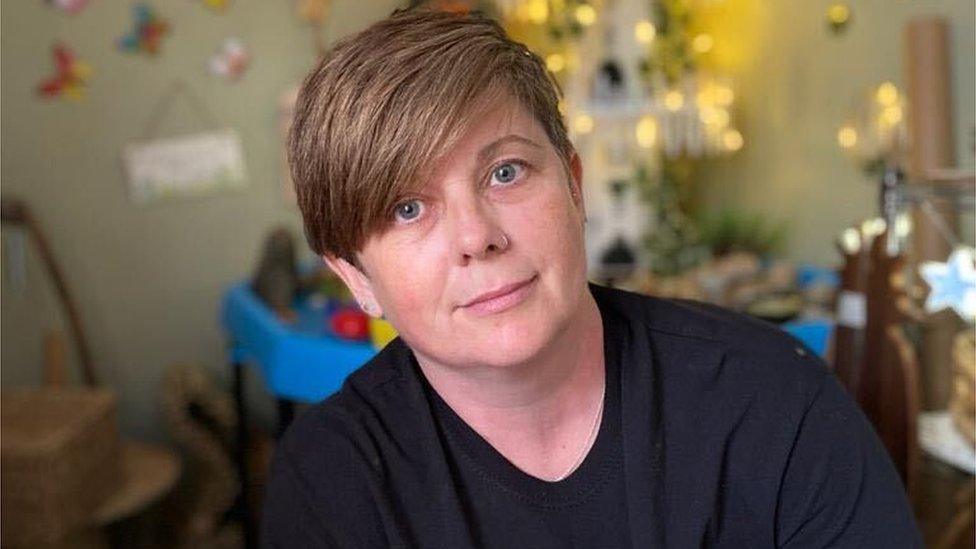Coronavirus: The childcare 'jigsaw' parents are facing this summer
- Published

Cambridge Kids Club has been able to run this year - but many other childcare providers had to remain closed
With kids off school and lockdown easing, childcare has become a summer issue for many parents returning to work. There have been warnings of a "perfect storm" for working parents - of rising costs and providers closing. So how are parents managing?
"I absolutely love my job," says 32-year-old Sharleen Smith, from Great Yarmouth. "I want to do my work."
Sharleen hated working from home during lockdown and was delighted to return to her magazine's office last month. But as the summer holidays approached, she became increasingly concerned about what to do with her seven-year-old daughter, Kourtney.
Every day she checked to see whether Kourtney's usual summer holiday club would open. Eventually it announced it would, but only for two weeks - leaving her and her partner with a four-week black hole over the summer holiday.
"I don't want to be dramatic but it has been terrifying for me," says Sharleen, who has mild autism and says she has lost sleep over the issue of childcare. "The unknown is the scariest thing possible."
Her solution involves a mix of friends, family and a nursery that is accepting older children. But this summer isn't cheap. The holiday club is twice its usual price, and the nursery is double that.
Sharleen is one of many parents struggling with a "childcare jigsaw" during the school holidays, with many providers unable to operate under coronavirus guidelines, according to Coram Family and Childcare Trust.
Research suggests mums appear to be doing most of the family childcare during lockdown, and are able to do less uninterrupted work compared to dads.
"As lockdown restrictions start to ease, many parents are being asked to go back to work but are facing the same childcare shortages they have been battling since lockdown began," says the charity's head Megan Jarvie.
"This summer more than ever, we are at risk of seeing parents having little choice but to give up work completely."
Holiday clubs have been particularly affected by government guidance being issued at "short notice", says Ms Jarvie.
Guidance published at the start of July - three weeks before most schools finished - said clubs must keep children in consistent bubbles of 15. This was later slightly relaxed after clubs pointed out the same children do not necessarily attend on the same days - but for many providers that came too late.
'Left in front of screens'
"We need clear daylight of six weeks to be able to mobilise our camps - and that would really be cutting it fine," says Neil Greatorex, founder of holiday club chain Barracudas.
This is the first summer in almost three decades he has not been able to open his sites. He says earlier guidance would have given him time to work out which of his 46 camps could run.
He thinks lots of parents will "struggle" this month. "The service they rely on just isn't going to be there in the same way it normally is. A substantial part of the provision that is there throughout the UK is going to be missing."

Sharleen Smith and her partner are having to spend more on Kourtney's childcare this year
In Cambridge, Panash Shah decided he would run his three holiday clubs this summer, but has had to increase fees to pay for extra cleaning and around 20 additional members of staff needed to supervise the bubbles.
After a "desperate rush" to work out logistics once the guidance was published, he says he has only allowed parents to book one-week blocks, rather than odd days here and there.
Panash thinks this has "scared off" parents who may only need childcare for two days and do not want to book the whole week at an increased price.
"What happens to those children? Will they be maybe potentially left in front of screens all day?" he asks. "Or would grandparents or other family members step in?"
Clare Freeman, of the Out of School Alliance, which supports holiday clubs, says the fact that grandparents "may be unable to help due to health concerns" will add to parents' woes.
"Even leaving children with friends is problematic as we are being advised not to mix households," she says.
Rising costs
In Cheshire, Gemma, a travel agent who did not want her surname to be used, has looked after her two children while on furlough. But with her colleagues starting to return to work, and her partner working full-time, she is not sure what she will do if she is asked to go back over the summer. She says she was told she will be put on unpaid leave if she can't come in.
Holiday clubs near her have limited spaces, and their usual childminders aren't taking on any more work. Childminders who are available are double the price, she says, costing more than £60 a day.
"I'm only on minimum wage anyway, so if and when I do go back to work and I have to start using a more expensive childminder it's probably pointless me going to work for the day."

Childminder Melanie Han still has work but says demand is far lower than usual
Gemma's usual childminders may be fully-booked, but half an hour's drive away in Warrington, Melanie Han is struggling to find business.
"Usually I've got a very, very long waiting list," the childminder says, explaining that she thinks demand has slipped because parents are either at home themselves or are worried about the virus. She knows other childminders who have stopped working altogether.
A recent survey conducted by the Professional Association for Childcare and Early Years (PACEY) suggested that around 40% of childminders were unsure if their businesses would be able to survive - particularly if the end of the furlough scheme in October leads to more redundancies.
"I'm advertising on everything, and nobody's coming back to me. That would suggest there's no childcare needed, but in some areas it's really busy," Melanie says.
Local demand
Last week, Labour warned of a "perfect storm" of providers closing down and rising childcare costs. PACEY estimates that nine out of 10 early years childcare settings are open, but on average are only half are full.
Ms Freeman puts local variations down to "demographics of different areas": "The decision of a local large employer regarding shutting down, or conversely recalling all furloughed staff back to work, will have a big effect on the local demand for childcare."
Back in Great Yarmouth, Sharleen is relieved that she has found childcare, even if it is costing a lot more. But she is also aware, because she works early hours, that she will need to find childcare for Kourtney between 07:00 and 08:30, when school starts again.
She used to use the school's breakfast club, but that's not due to go ahead. "I am worried about that," she says. "I'm just actively trying to find a childminder that I can potentially take her to do the mornings. But I have got to a stage where there's not really much I can do about it at the moment."
- Published29 July 2020

- Published20 July 2020
